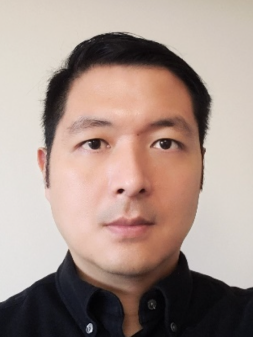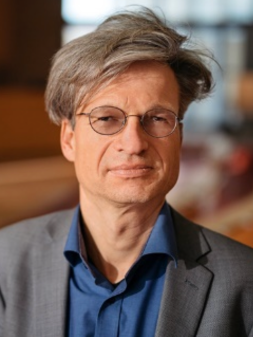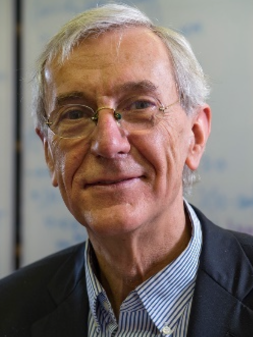AI Panel Series
| Date | Tuesday, 16 April 2024 2:00 PM - 3:00 PM |
|---|---|
| Location | Room E7 |
| Website Description |
AI Panel Series
"The Impact of Recent ML and AI Advancements in Signal Processing Education and Research"
This roundtable discussion, part of the SPS Panel Series sponsored by the SPS Education Board, will discuss how recent advances in machine learning and artificial intelligence are impacting signal processing education and research practices. |
| Panelist Speaker |
Gene Cheung, York University
Gene Cheung received the B.S. degree in electrical engineering from Cornell University in 1995, and the M.S. and Ph.D. degrees in electrical engineering and computer science from the University of California, Berkeley, in 1998 and 2000, respectively. He was a senior researcher in Hewlett-Packard Laboratories Japan, Tokyo, from 2000 till 2009. He was an assistant then associate professor in National Institute of Informatics (NII) in Tokyo, Japan, from 2009 till 2018.He is now a professor in York University, Toronto, Canada, where he is also a York Research Chair (YRC) and serves as the Vice-Chair of Engineering in the EECS department. He serves as scientific advisor in Growers Edge, Iowa, USA.His research interests include 3D imaging and graph signal processing. He has served as associate editor for multiple journals, including IEEE Transactions on Multimedia (2007--2011), IEEE Transactions on Circuits and Systems for Video Technology (2016--2017) and IEEE Transactions on Image Processing (2015--2019). Dr. Cheung currently serves as senior associate editor for IEEE Signal Processing Letters (2021--present). He is a co-author of several paper awards and nominations, including the best student paper finalist in ICASSP 2021, best student paper award in ICIP 2013, ICIP 2017 and IVMSP 2016, best paper runner-up award in ICME 2012, and IEEE Signal Processing Society (SPS) Japan best paper award 2016. He is a recipient of the Canadian NSERC Discovery Accelerator Supplement (DAS) 2019. He is a fellow of IEEE.
Danilo P. Mandic, Imperial College London
Danilo P. Mandic received the Ph.D. degree in nonlinear adaptive signal processing in 1999 from Imperial College, London, London, U.K. where he is now a professor. He specializes in Statistical Learning Theory, Machine Intelligence, and Statistical Signal Processing, and their applications especially in Biomedicine and Finance. He is a pioneer of Hearables (in-ear sensing of neural function and vital signs), an unobtrusive, discreet and long-term wearable solution for long-term physiological monitoring based on miniaturized sensors embedded on an earplug, an area where he holds several patents. He also specializes in Machine Intelligence for Finance, and is a Director of the Financial Signal Processing and Machine Learning Lab a Imperial. He has written over 600 journal and conference articles, and research monographs on “Recurrent Neural Networks” (with Wiley, 2001), “Complex-valued Adaptive Filters and Neural Networks” (Wiley 2009), “Tensor Networks for Dimensionality Reduction and Large Scale Optimization” (Now Publishers, 2017) and “Data Analytics on Graphs” (Now Publishers, 2021).Prof Mandic is a 2019 recipient of the Dennis Gabor Award for "Outstanding Achievements in Neural Engineering", given by the International Neural Networks Society (INNS). He is also a 2018 winner of the Best Paper Award in IEEE Signal Processing Magazine, for his article on Tensor Decompositions for Signal Processing Application, and the 2021 winner of the Outstanding Paper Award in the IEEE ICASSP conference. He is also a winner of The Prize in the 2023 IEEE Engineering in Medicine and Biology Prize Paper Awards and has coauthored 6 more award winning articles. He is a Core Member of the Machine Learning Initiative at Imperial. Danilo is the President of the International Neural Networks Society, and a past Technical Chair of ICASSP 2019, held in Brighton UK. He also received President's Award for Excellence in Research Supervision at Imperial College in 2014. Dr. Mandic is passionate about cross-disciplinary aspects of his work and about bringing research into the curriculum. His current research interest areas are Adaptive Learning Theory, Big Data, Machine Learning on Graphs, Neural Networks, and Complexity Science, and their applications in Biomedicine and Financial Engineering.
Martin Haardt, Ilmenau University of Technology
Martin Haardt is a Full Professor in the Department of Electrical Engineering and Information Technology and Head of the Communications Research Laboratory at Ilmenau University of Technology, Germany. After studying electrical engineering at the Ruhr-University Bochum, Germany, and at Purdue University, USA, he received his Diplom-Ingenieur (M.S.) degree from the Ruhr-University Bochum in 1991 and his Doktor-Ingenieur (Ph.D.) degree from Munich University of Technology in 1996. Dr. Haardt is a Fellow of the IEEE and of EURASIP and the recipient of the 2009 Best Paper Award from the IEEE Signal Processing Society, the Vodafone (formerly Mannesmann Mobilfunk) Innovations-Award for outstanding research in mobile communications, the ITG best paper award from the Association of Electrical Engineering, Electronics, and Information Technology (VDE), and the Rohde & Schwarz Outstanding Dissertation Award. Dr. Haardt was responsible for strategic research for third generation mobile radio systems and later the Director for International Projects and University Cooperations in the mobile infrastructure business of Siemens Mobile Networks in Munich, Germany. During his time at Siemens, he also taught in the international Master of Science in Communications Engineering program at Munich University of Technology. Dr. Haardt was a visiting professor at the University of Nice in Sophia-Antipolis, France, and at the University of York, UK, an Honorary Visiting Professor in the Department of Electronics at the University of York, UK, and an Invited Professor at the Université de Lorraine in Nancy, France. His research interests include wireless communications, array signal processing, high-resolution parameter estimation, as well as numerical linear and multi-linear algebra. Dr. Haardt has served in multiple capacities in the editorial board of several top technical journals, in various IEEE Signal Processing Society committees, and the technical committee of multiple international conferences.
José Moura, Carnegie Mellon University
José M. F. Moura is the Philip L. and Marsha Dowd University Professor at Carnegie Mellon University. He holds a Licenciatura in Electrical Engineering from Instituto Superior T´ecnico (IST) and MSc, E.E., and D.Sc. degrees from MIT. He was a visiting Professor at MIT (1984-86, 1999-00, and 2006-07) and at NYU (210-14). His interests are in statistical, algebraic, and graph signal processing. He has published extensively and holds 17 patents, with the technology of two (co-inventor Alek Kavcic) found in over 3 billion disk drives of over 60% of all computers sold worldwide in the last 20 years, the subject of the then largest IP settlement in the ICT areas, US $750 Million, between CMU and a semiconductor company. He is a Fellow of the IEEE, AAAS, US Academy of Inventors, and member of the Academy of Sciences of Portugal and of the US National Academy of Engineering. He holds doctor honoris causa degrees from University of Strathclyde (UK) and Universidade de Lisboa (Portugal). He received several awards, including the now called IEEE Signal Processing Society (SPS) Claude Shannon– Harry Nyquist Technical Achievement Award and the IEEE SPS Norbert Wiener Society Award, and the 2023 IEEE Kilby Medal. He has received the Great Cross of Infante D. Henrique bestowed to him by the President of the Republic from Portugal. Dr. Moura has introduced at CMU a graduate course in “Network Science” in 2012 that he taught over a period of five years and introduced a graduate course in “Graph Signal Processing and Geometric Learning” in 2020 that, so far, he has taught twice.
|
